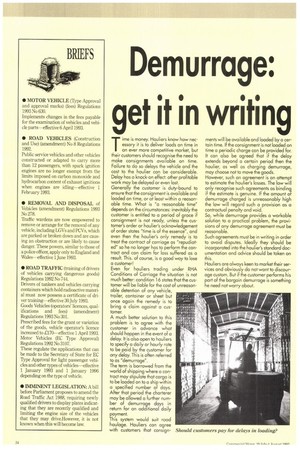Demurrage: i get it n writing
Page 36

If you've noticed an error in this article please click here to report it so we can fix it.
Time is money. Hauliers know how necessary it is to deliver loads on time in an ever more competitive market, but their customers should recognise the need to make consignments available on time. Failure to do so delays the vehicle and the cost to the haulier can be considerable. Delay has a knock-on effect: other profitable work may be delayed or even lost.
Generally the customer is duty-bound to ensure that the consignment is available and loaded on time, or at least within a reasonable time. What is "a reasonable time" depends on the circumstances: inevitably the customer is entitled to a period of grace if consignment is not ready, unless the customer's order or haulier's acknowledgement of order states "time is of the essence", and even then the haulier's only remedy is to treat the contract of carriage as "repudiated" so he no longer has to perform the contract and can claim for loss suffered as a result. This, of course, is a good way to lose a customer!
A much better solution to this problem is to agree with the customer in advance what should happen in the event of a delay. It is also open to hauliers to specify a daily or hourly rate to be paid by the customer for any delay. This is often referred to as "demurrage". The term is borrowed from the world of shipping where a contract may stipulate that cargo is to be loaded on too ship within a specified number of days. After that period the charterer may be allowed a further number of demurrage days in return for an additional daily payment. This system would suit road haulage. Hauliers can agree with customers that consign ments will be available and loaded by a certain time. If the consignment is not loaded on time a periodic charge can be provided for. It can also be agreed that if the delay extends beyond a certain period then the haulier, as well as charging demurrage, may choose not to move the goods. However, such an agreement is an attempt to estimate the haulier's losses. The law will only recognise such agreements as binding if the estimate is genuine. If the amount of demurrage charged is unreasonably high the law will regard such a provision as a contractual penalty and void.
So, while demurrage provides a workable solution to a practical problem, the provisions of any demurrage agreement must be reasonable.
Such agreements must be in writing in order to avoid disputes. Ideally they should be incorporated into the haulier's standard documentation and advice should be taken on this.
Hauliers are always keen to market their services and obviously do not want to discourage custom. But if the customer performs his part of the bargain demurrage is something he need not worry about.








































































